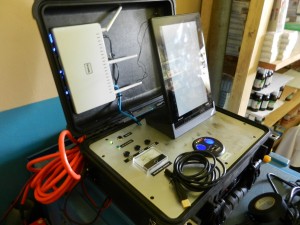 Some groups have criticized the Office of the National Coordinator for Health Information Technology for not building usability requirements into the national standards for "meaningful use" of electronic health records, suggesting that usability issues have hindered adoption.
Some groups have criticized the Office of the National Coordinator for Health Information Technology for not building usability requirements into the national standards for "meaningful use" of electronic health records, suggesting that usability issues have hindered adoption.
Though it hasn't been designed to help providers achieve meaningful use – or necessarily for the U.S. market – a new mobile records system takes usability to a whole new level.
Vecna Cares, the charitable arm of Cambridge, Mass.-based health IT and robotics firm Vecna Technologies, and their jointly run Global Health Initiative have designed an EHR interface for people with limited computer literacy, suitable for use in areas without reliable electrical service. The system, called Clinical Patient Administration Kit (CliniPAK), is a portable, wireless data collection and reporting kit in a suitcase-sized case.
Designed for community health workers, CliniPAK features a touch-screen tablet with software providing automated patient check-in, vitals capture, clinical decision support, case review and support for biometric and RFID devices. The box also includes an on-board server and solar-powered charger.
“What we really try to do with CliniPAK was to be thinking long-term and thinking sustainable,” CliniPAK Project Manager Emily Wang tells Xconomy Boston. “We built a technology infrastructure from the ground up, that’s not disease-specific and not one app. We look at a patient’s health holistically.”
CliniPAK includes a module for automatically reporting data on population health and infectious diseases to public health authorities, greatly speeding up this activity. “The work was normally done on very big paper registers, and was a cumbersome process,” Wang says. “On top of that, the biggest time sink was at the end of month when [doctors] needed to generate reports.”
The clinical decision support can be programmed for specific medical missions to isolated parts of the world, with a focus on diseases and diagnoses common in a given country or region.
Rural clinics in Kenya have been using the system for about three years, according to Xconomy, and Vecna Cares last year brought CliniPAK to the semi-autonomous Zanzibar region of Tanzania. The latest installation is stateside, at Worcester Free Clinics in Massachusetts.
Last week, Vecna held a hackathon aimed at improving the technology.
Interestingly, another group with a similar system in a different package, MIT-affiliated Sana, also is right there in Cambridge. Sana won $150,000 in prize money from Vodafone Americas Foundation and the mHealth Alliance in 2010 for its open-source platform for health workers to capture and send EHR data from mobile phones.
This year, Sana and a Brazilian partner won the GSMA Mobile Health University Challenge for its mobile telemedicine platform that tests newborns for hearing impairment.
Read more about CliniPAK on the Vecna Cares website.















